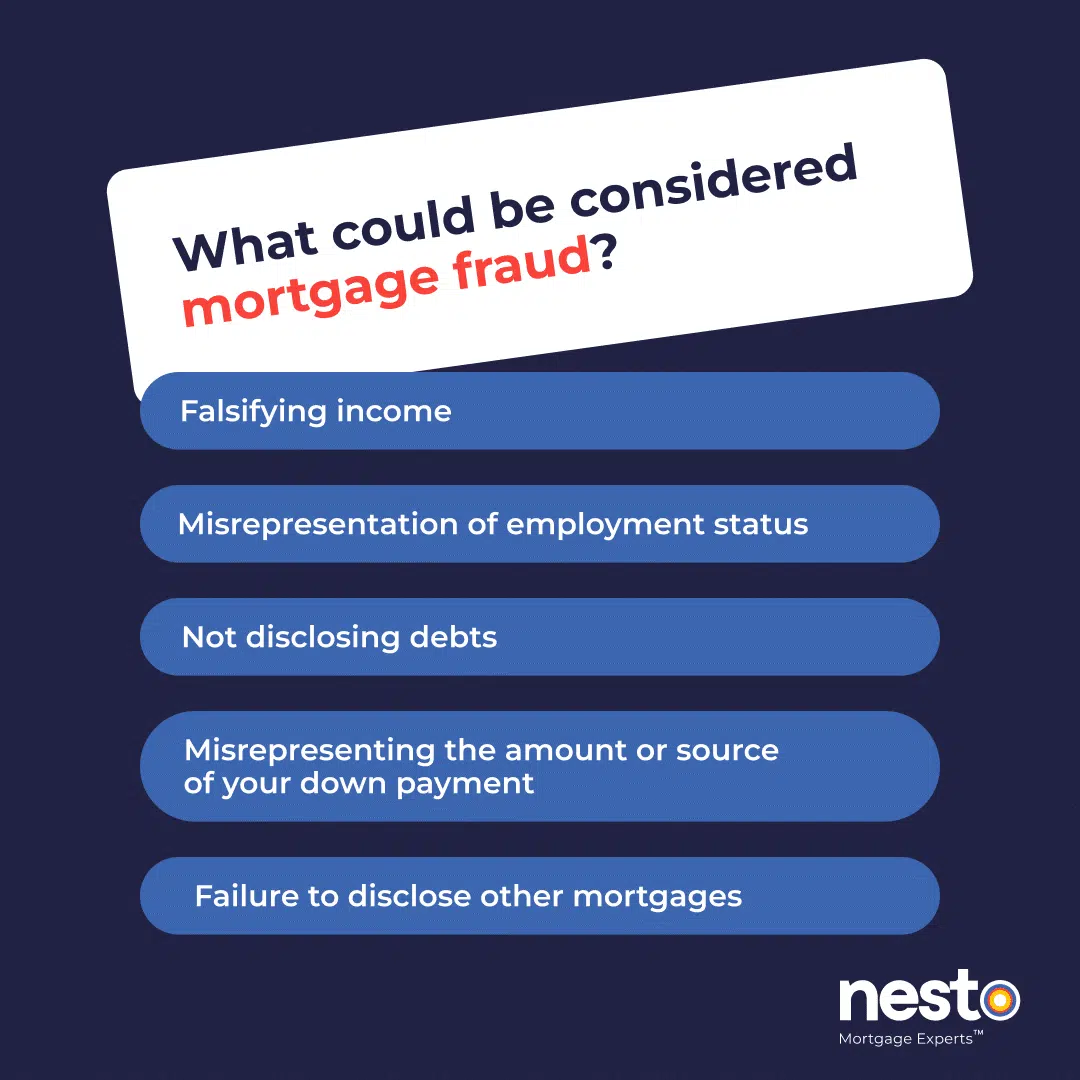Mortgage Basics #Featured articles
Mortgage Basics #Featured articles
Mortgage Fraud: What Is It & Who to Trust

Table of contents
Mortgage fraud is an escalating issue in the real estate and financial sectors, with far-reaching consequences for borrowers, homeowners, lenders, and the broader economy. It involves the deliberate misrepresentation, omission, or concealment of information by individuals or groups to purchase a property, secure a mortgage or obtain a larger loan than you would otherwise qualify for.
Mortgage fraud in Canada continues to grow due to the high demand for homes, soaring interest rates, and inflated property values. It is illegal and can result in severe legal consequences, including fines, imprisonment, and asset forfeiture. As the housing and mortgage market becomes increasingly complex and competitive, consumers and professionals must be vigilant in identifying and preventing fraudulent activities.
Key Takeaways
- Mortgage fraud is a serious crime with severe consequences for borrowers and lenders.
- There are several types of mortgage fraud, with fraud for shelter and title fraud being among the most common.
- Protect yourself from mortgage fraud by being honest on your mortgage application and monitoring your credit report for suspicious activity.
What Is Mortgage Fraud?
Mortgage fraud involves intentionally misrepresenting or omitting information on a mortgage application or during the mortgage lending process to secure a loan, higher loan amount, or more favourable terms that otherwise would not have been granted if the information was truthful. Mortgage fraud can also occur if someone else using your identification falsifies information to secure a loan in your name or change the title of your home.
Perpetrators of mortgage fraud can range from individual borrowers to industry insiders and sophisticated criminal networks. Their motivations often revolve around financial gain, such as acquiring a property they wouldn’t otherwise qualify for or profiting from artificially inflated property values.
Mortgage fraud is not just a financial crime; it undermines trust in the mortgage and housing market and can lead to significant losses for lenders and borrowers. Understanding the different forms of mortgage fraud is essential to protect yourself and others involved.
Why Would Someone Commit Mortgage Fraud?
One of the most common reasons borrowers commit mortgage fraud is for financial gain. This can include falsifying information to qualify for a property or a more expensive property than what the borrower would otherwise be eligible for. Often, borrowers who commit mortgage fraud misrepresent their income or debts to secure a mortgage.
However, industry professionals can also commit fraud for financial gain. This usually occurs when lenders, mortgage brokers, real estate brokers, lawyers, appraisers, title insurers, or credit agency employees are involved in a scheme to defraud borrowers for profit.

Types Of Mortgage Fraud
Several types of mortgage fraud are common in Canada. The following are a few examples of the types of mortgage fraud that can occur. Both lenders and borrowers need to be aware of the signs of fraud and take steps to prevent it from happening.
Mortgage Fraud for Shelter
This type of fraud is typically first-party fraud that occurs when borrowers misrepresent or falsify information on their mortgage application to qualify. It could involve submitting inaccurate or false documents with an income higher than you make, stating you are a full-time salaried employee when you are not, not disclosing all debts or other mortgages, or saying you plan to live in the home (owner-occupied) when the intent is to rent it out (investment property).
Borrowers who commit this type of mortgage fraud typically do so to obtain homeownership by qualifying for more than what they could otherwise afford. This type of fraud tends to increase when borrowers face a difficult mortgage market with high home prices and interest rates. Borrowers who commit mortgage fraud for shelter will be liable for any financial losses in the event of default and could be held criminally responsible, impacting their future ability to qualify for credit or another mortgage.
Title Fraud
Title fraud is becoming one of Canada’s most talked-about types of mortgage fraud. If you own a home, you could be at risk of title fraud, especially if you are mortgage-free. Title fraud occurs when someone steals your identity to impersonate you, forging documents to take legal possession of your property by obtaining the title. Once they legally possess your home, they can remortgage, taking the proceeds, leaving you with a defaulted mortgage. They may also sell the home to an unsuspecting buyer and transfer the title to the new owner.
Homeowners can protect themselves from title fraud by having title insurance. This insurance will help you if you become a victim of title fraud by covering you for any losses and helping you through the legal process. If you don’t have title insurance, you will be on your own, and you will need to incur all legal costs required to go through the lengthy process of proving the home is yours or that you’ve been the victim of fraud and shouldn’t be required to repay the mortgage.
Additionally, if you are away for extended periods and your home is vacant, you should take proactive steps to ensure someone you trust can check in on it and that no one has claimed it as their own. You can also set up Google alerts for your address to notify you if your home is ever listed for sale or rent while you’re away.
Mortgage Fraud for Profit
This type of fraud occurs when one or more persons work together with a purchaser to sell a property at an artificially inflated price. The price is then used to deceive lenders into issuing higher-value loans or other homebuyers into purchasing at an inflated price while concealing the property’s actual value.
This mortgage fraud is not about purchasing a home; it uses the lending process to steal cash or equity from unsuspecting lenders or homebuyers. It typically involves industry insiders, such as real estate brokers, mortgage brokers, lawyers, title insurers, real estate appraisers, credit agency employees, or outside investors.
Homebuyers can get around this type of fraud by having their appraisal completed by an unrelated and lender-sanctioned appraiser to understand the property’s actual value as part of their condition of financing.
Straw Buyer Fraud
This is another type of mortgage fraud for profit, where fraudsters persuade a straw buyer to put their name on a mortgage application in exchange for cash or a fee. They lend their good credit and identity to buy the property and could be unaware they are participating in fraud.
Straw buyers could be friends, acquaintances, or strangers. Typically, the fraudster pockets the money, leaving the straw buyer to repay the mortgage on the property when it goes into default. Some straw buyers are in on the scheme, pretending to be buyers, working in collusion with others, using fake or stolen identification to constantly flip a property to inflate the price and obtain larger mortgages.
Foreclosure Fraud
This fraud typically targets homeowners at risk of defaulting on their mortgage or already in foreclosure. Fraudsters may convince you to transfer the property title to them in exchange for a loan. They usually keep your payments, and since they have the title to your home, they can resell or refinance the property. This can leave you without a home and in even more debt.
Mortgage Fraud for Commission
This type of insider fraud occurs when brokers or other industry professionals collaborate using fraudulent documents submitted to obtain mortgages. These fraudulent mortgages increase their commissions by increasing their number of approved mortgages or home sales.
Syndicated Mortgage Fraud
Syndicated mortgages are legitimate investments. Borrowers find private lenders to invest money in a property, combining the funds into a single mortgage instead of getting a mortgage through a bank. They are typically used to fund commercial or residential real estate developments, including condos and office or retail spaces.
Investors are individually registered on the land title and typically receive a higher rate of return than they could make with other investments, plus the guaranteed return of their original investment back when the property sells. Meanwhile, the property value backs their investment.
However, syndicated mortgage fraud occurs when borrowers inflate the property’s value and use this to steal investor funds. Sometimes, there may not even be a mortgage on the property investors believe they have invested in. While investors in these cases may initially receive interest payments on their investment, this is usually temporary, and they also lose their original investment.
How to Protect Yourself from Mortgage Fraud
Preventing mortgage fraud requires vigilance, honesty, and a commitment to due diligence. Here are some steps you can take to protect yourself:
- Be Honest on Your Application: Always provide accurate and complete information when applying for a mortgage. Misrepresentation can lead to legal consequences and financial ruin.
- Seek Independent Legal Advice: Consult an independent legal professional who can provide objective advice before signing any mortgage or property-related documents.
- Get a Property Assessment: Ensure that the property you’re buying is accurately appraised and that all necessary inspections are completed.
- Verify Credentials: Work only with licensed and reputable lawyers, mortgage brokers, real estate agents, and appraisers. Check their credentials on the provincial industry regulator’s website, where the property is located, and look for past disciplinary actions or complaints.
- Monitor Your Credit Report: Regularly review your credit report for any unauthorized inquiries or accounts which could indicate identity theft or fraud.
- Monitor Your Online Identity and Address: Set up Google Alerts for your address and your name separately to monitor any information that surfaces online, such as identity theft or your home listed for sale.
Legal and Regulatory Protections
To combat the growing threat of mortgage fraud, governments and regulatory bodies have implemented various laws and regulations designed to protect consumers and the integrity of the housing market. These regulatory protections are crucial but only effective when combined with public awareness and proactive measures by borrowers and industry professionals.
One significant legislative measure is the Homeowner Protection Act 2024 in Ontario, which aims to prevent predatory lending schemes targeting vulnerable homeowners, particularly older Canadians. This law bans the registration of consumer Notices of Security Interest (NOSIs) on the land registry, a tactic often used in fraudulent schemes to place financial claims against a property without the owner’s knowledge.
Find a better rate, and we’ll match it, beat it, or give you $500*.
*Conditions Apply
With nesto, it’s stress-free
How Virtual and AI Tools Are Influencing Mortgage Fraud
Virtual and AI (Artificial Intelligence) tools are increasingly influencing the mortgage industry and impacting mortgage fraud in Canada. These tools are designed to improve the efficiency and accuracy of mortgage processes, but criminals are also using them to commit fraud.
Virtual and AI tools are being used for fraud by creating fake identities that can be used to apply for mortgages or other financial products. They can manipulate data, including property values, and create fake documents, such as employment letters, pay stubs, and bank statements, to support a fraudulent mortgage application.
Phishing scams can also be created to obtain sensitive information, such as social insurance numbers, bank account details, and other personal information. Finally, some lenders are using AI tools to automate the loan approval process, which can increase the risk of fraud.
However, virtual and AI tools can also help detect potential mortgage fraud. Machine learning algorithms, for example, can analyze data patterns and identify anomalies that could indicate fraudulent activity. AI tools can also automate the review of loan applications and identify any inconsistencies in the application or supporting documents.
Robust anti-fraud measures must be implemented to combat mortgage fraud facilitated by virtual and AI tools. This includes identity verification checks, independent appraisals, and thorough document verification. Lenders, brokers, and other mortgage industry professionals should also be vigilant for suspicious activity and be prepared to report suspected fraud to the appropriate authorities.
Frequently Asked Questions
What is mortgage fraud?
Mortgage fraud is the deliberate misrepresentation or omission of information during the mortgage lending process to secure a loan or obtain more favourable terms than would otherwise be available. Fraudsters can also commit mortgage fraud by using stolen or faked identity to take out a mortgage or switch the title of your home. Industry insiders can also be tied to mortgage fraud, using various methods to commit fraud for financial gain.
How can I protect myself from title fraud?
You can protect yourself from title fraud by purchasing title insurance, monitoring your online identity and address, and taking proactive steps to secure your property, especially if it is vacant for extended periods.
What are the consequences of committing mortgage fraud?
The consequences of mortgage fraud can be severe, including financial losses, damage to your reputation and credit score, legal repercussions, and potential criminal charges.
Final Thoughts
Mortgage fraud is a serious issue that can have devastating consequences for individuals and the broader financial system. Understanding the different types of mortgage fraud, recognizing the warning signs, and taking proactive steps to protect yourself can minimize your risk of becoming a victim. Trustworthy professionals and robust legal protections play a vital role in safeguarding against fraud.
Ready for a transparent and trustworthy mortgage journey? Connect with our Nesto mortgage experts today and experience the difference!
Ready to get started?
In just a few clicks, you can see our current rates. Then apply for your mortgage online in minutes!















